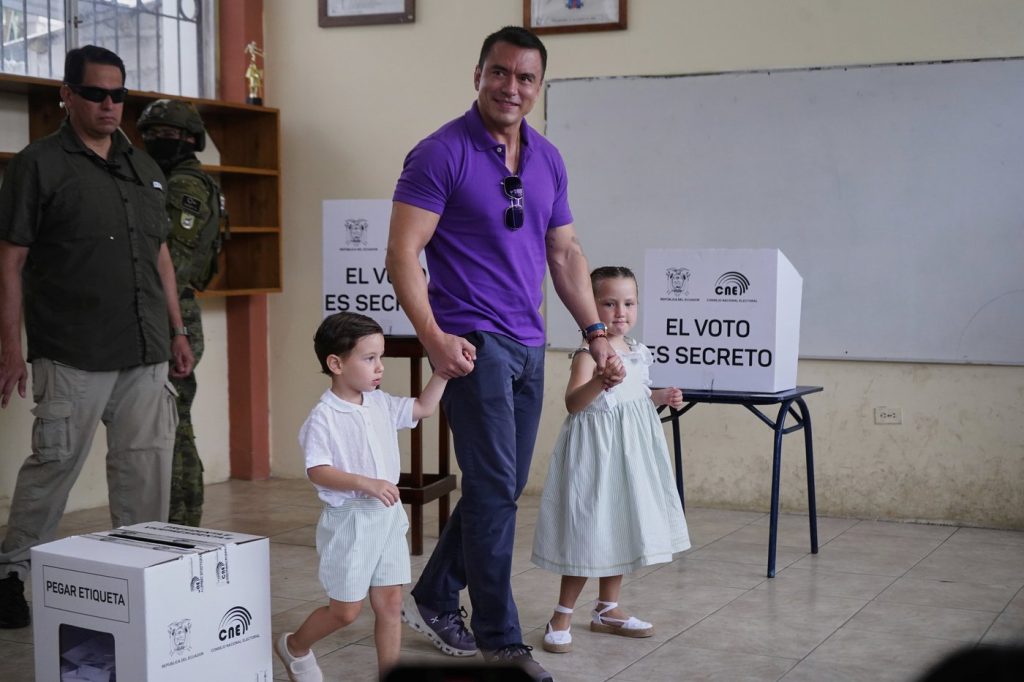QUITO, Ecuador (AP) — In a remarkable political upset, Daniel Noboa captured the presidency in a snap election in 2023, securing a 16-month term after only a brief tenure as a lawmaker and lacking a robust political infrastructure. Initially seen as a political novice, Noboa, a 37-year-old conservative millionaire and heir to a banana empire, triumphed again over Luisa González, the protégé of Ecuador’s most influential recent president, in the election held on Sunday, April 13, 2025, thus earning a full four-year term in office.
Noboa’s electoral victory, with preliminary results indicating he garnered 55.8% of the vote compared to González's 44%, represents a continuation of his controversial yet popular crime-fighting policies. Despite his approval among a significant portion of the electorate, these strategies have raised concerns regarding their adherence to legal and governance norms. Following the announcement of an "irreversible trend" favoring Noboa, he expressed gratitude to his supporters, emphasizing a desire for Ecuador to pursue progress and change.
Before entering politics, Noboa launched an event organizing business at age 18 and later joined his family’s company, Noboa Corp., where he gained experience in shipping, logistics, and commerce. His political career began in 2021 when he won a seat in the National Assembly and led its Economic Development Commission. Noboa won a previous snap election triggered by former President Guillermo Lasso’s dissolution of the National Assembly and subsequently defeated González again in the runoff election.
During his initial term, Noboa witnessed a decrease in the homicide rate from 46.18 per 100,000 people in 2023 to 38.76 per 100,000 in 2024. However, these figures remain drastically higher than the 6.85 homicides per 100,000 reported in 2019. Noboa's administration has also sought to cultivate a positive relationship with the U.S., particularly during the Trump administration. Experts noted that this diplomatic approach resonated with many Ecuadorians, especially those with migrant family members concerned about deportations associated with a leftist governance under González.
Noboa's aggressive crime-fighting tactics, however, have come under scrutiny both domestically and internationally. He declared a state of internal armed conflict in January 2024 to empower the military to combat organized crime, particularly in prisons, which are a focal point of violence and criminal activity. A particularly controversial incident involved Noboa's approval of a police raid on the Mexican embassy in Quito to apprehend former Vice President Jorge Glas, a convicted criminal who had taken refuge there.
In a notable deviation from traditional governance practices, Noboa delegated presidential powers to his unelected Vice President, Verónica Abad, earlier this year, which was necessitated by the Ecuadorian Code of Democracy. Yet, tensions soon emerged between Noboa and Abad, resulting in her reassignment as ambassador to Israel shortly after he took office. Abad has publicly described her diplomatic post as a “forced exile,” indicating a significant rift within Noboa's administration.
As Noboa approaches his new term, political analysts wonder how his administration's strategies will evolve in light of the unfolding dynamics, including his controversial governance style and the implications for society as he aims to tackle crime and enhance Ecuador's standing under his leadership.










